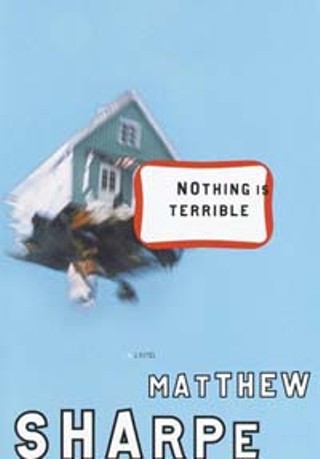Nothing Is Terrible
Reviewed by Barry Johnson, Fri., May 5, 2000

Nothing Is Terrible
by Matthew SharpeVillard, 269 pp., $23.95
Who knew Matthew Sharpe and Charlotte Brontë have so much in common? Sharpe's hilarious novel pays homage to Brontë's Jane Eyre in both story and character but takes on a life of its own from there, incorporating pointed satire and wit with serious, often depressing situations. The finished product is something of an acquired taste. Sharpe's narrative universe is a world unto itself, full of miscreants, perverts, drug dealers, and the like, which functions as a potent vehicle for social criticism. Above all else, though, Nothing Is Terrible is humorous, sometimes hysterical, and relentlessly sarcastic.
Sharpe turns the tables on the coming-of-age tale from the get-go, establishing his "humble memoirist" narrator as something of a gender bender. Though known as Mary at birth, she often asks to be addressed as Paul, in memory of her deceased twin brother. And though she prides herself on her breasts, she also has reproductive organs of the male variety. How does poor Mary handle such a crisis? She sleeps with both men and women, of course.
Raised by her ultra-vain uncle and her ultra-dull aunt, Mary makes a life for herself at the tender age of 11 by running off with her teacher, September "Skip" Hartman, a woman "making a lifelong effort to cultivate the raw material of herself through things like posture." Sharpe isn't interested in the psychology or mechanics of how one runs off to New York City with a 37-year-old woman. He simply relays the events as they happened through the clouded eyes of Mary, who, in retrospect, is able to make the tartest observations in the most matter-of-fact manner ("I suppose I have a kind of luck in sharing my misery with others and receiving their gratitude in return.").
Once in New York City, Mary and Skip conduct their daily activities (sex, home schooling, etc.) just as any married couple would, and without the slightest regard to what anyone else thinks of the situation ("caring did not strike me as a useful activity"). Mary subsequently encounters a variety of characters who, in a bizarre and often outrageous context, provide her with enough knowledge and experience to allow her to live her own life.
Sharpe's commentary on the contemporary family works so well because he presents events in such a gentle, inviting narrative form that the mere simplicity of the language counteracts the events themselves. What begins as a lighthearted reminiscence of things past evolves into a strangely inspiring tale of identity that gives new meaning to the word "dysfunction."
Matthew Sharpe will be at BookPeople on Tuesday, May 9, at 7pm.








